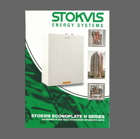Stokvis offers HIUs

Stokvis Energy Systems has responded to the popularity of communal- and district-heating systems by offering its H-Series Econoplate heat interface units (HIUs). There is a choice of single- and twin-plate units to provide heating and hot-water services in dwellings.
These units are small enough to fit within a kitchen or utility cupboards and incorporate all necessary valves, controllers and energy metering.
Econoplate H2 twin-plate units separate the district- or communal-heating system from the dwelling and separate heating and hot water using two plate heat exchangers.
H1 single-plate units have direct heating where the district water circulates around the dwelling, and hot water is via a plate heat exchanger.
H1 units can also be provided for heating only with separation of district mains from the dwelling — again with a single plate heat exchanger. This option would be used if there is no hot water or hot water is to be provided by an indirect cylinder or other means.
This range extends to cover underfloor heating with flow temperatures down to below 45°C, as is characteristic of many heat pumps, whilst also providing a separate hot-water supply via a separate plate heat exchanger.
An anti-lock feature runs the pump for 5 s a day during periods of non-use. The pump is also run on after hot water has been drawn off to prevent calcification.
Detailed technical literature can be downloaded from the company’s web site.







